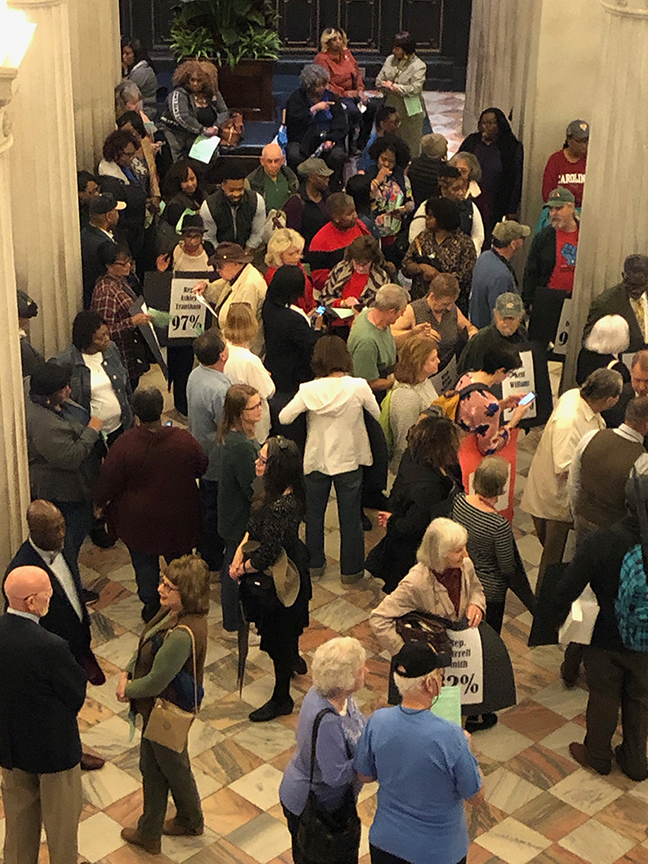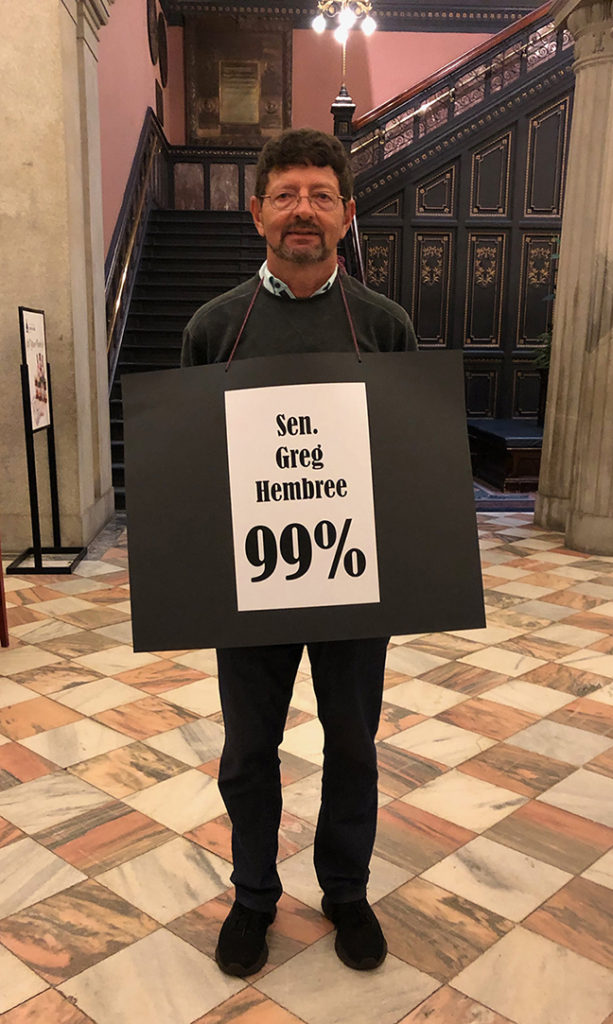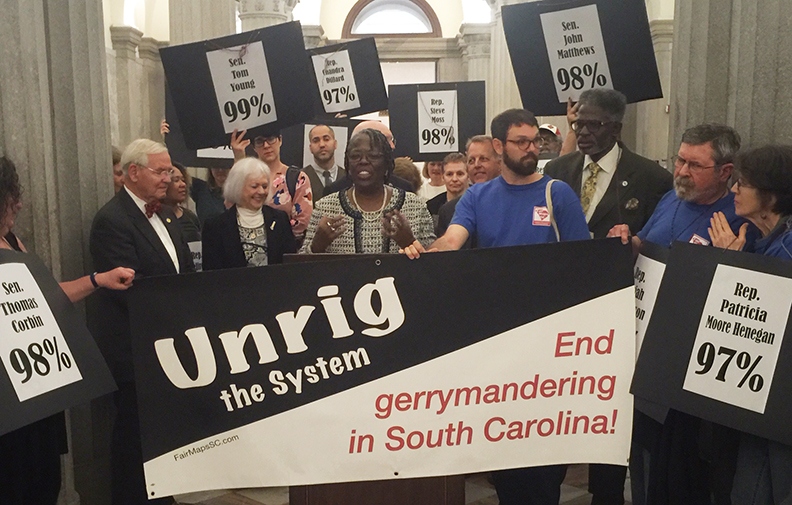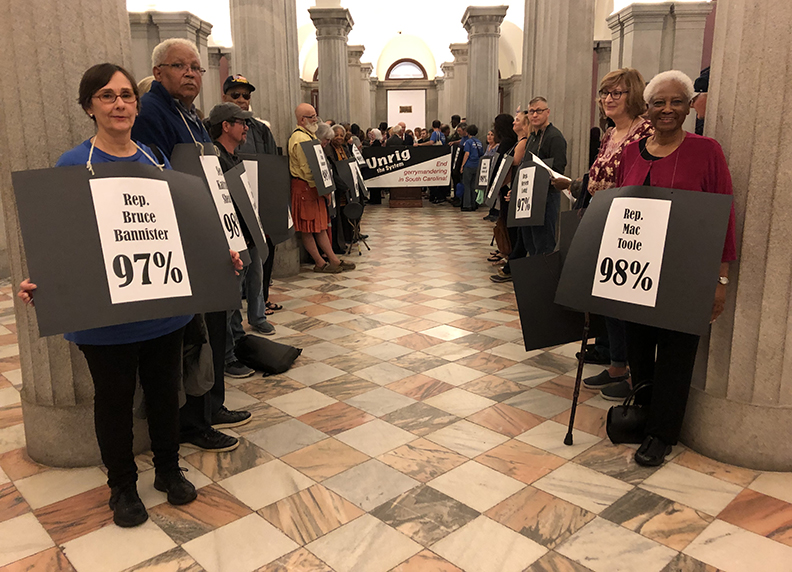 On the first day of the SC 2020 legislative session, fair maps advocates gathered at the State House holding signs with the names of state lawmakers and the percentage by which each won their seats. The original plan to assemble on the front steps of the State House was rained out, but it didn’t dampen the spirits of those who filled the lobby.
On the first day of the SC 2020 legislative session, fair maps advocates gathered at the State House holding signs with the names of state lawmakers and the percentage by which each won their seats. The original plan to assemble on the front steps of the State House was rained out, but it didn’t dampen the spirits of those who filled the lobby.
Some drove hours to be there — from Charleston, Greenville, Rock Hill, and more than a dozen from Horry County, where activists have been working a county-based petition drive for fair maps in South Carolina.
Brian Kasprzyk and his wife, Malle Kasprzyk, drove from Little River. It was a long trip, but worth the drive, he said. On the Fair Maps Facebook group, he posted: “Today was a great day for democracy and fair maps in South Carolina. It was great because 2 republican and 2 Democratic legislators joined together to address the crowd and support redistricting legislation — for the first time.”
Brian Kasprzyk
It’s true. In an unprecedented move, a bipartisan group of SC lawmakers stood in the State House together to make a strong and unified public statement against gerrymandering in South Carolina. Democrats Rep. Gilda Cobb-Hunter and Sen. Mike Fanning joined Republicans Rep. Gary Clary and Sen. Tom Davis at a morning press conference on Jan. 14.
Retired Sen. Phil Leventis made opening comments. In his 32 years as a state lawmaker, he took part in five redistricting sessions. “In 2002, we reapportioned the Senate,” he said, “and before the elections in 2004 it was reapportioned again. I can’t tell you why. But I can tell you it raises questions about the whole process. And the process needs to be fair.”
The system is broken. Fact is, 75 percent of South Carolina voters have only one name on the ballot for House or Senate. Ninety percent of legislative seats were won with an average of 86% of the vote. Just 10 percent of the General Assembly was won by less than 60 percent. That’s 17 seats out of 170.
Competitive districts make winners work to please a majority of the voters, not just the small percent that turns out for the primary.
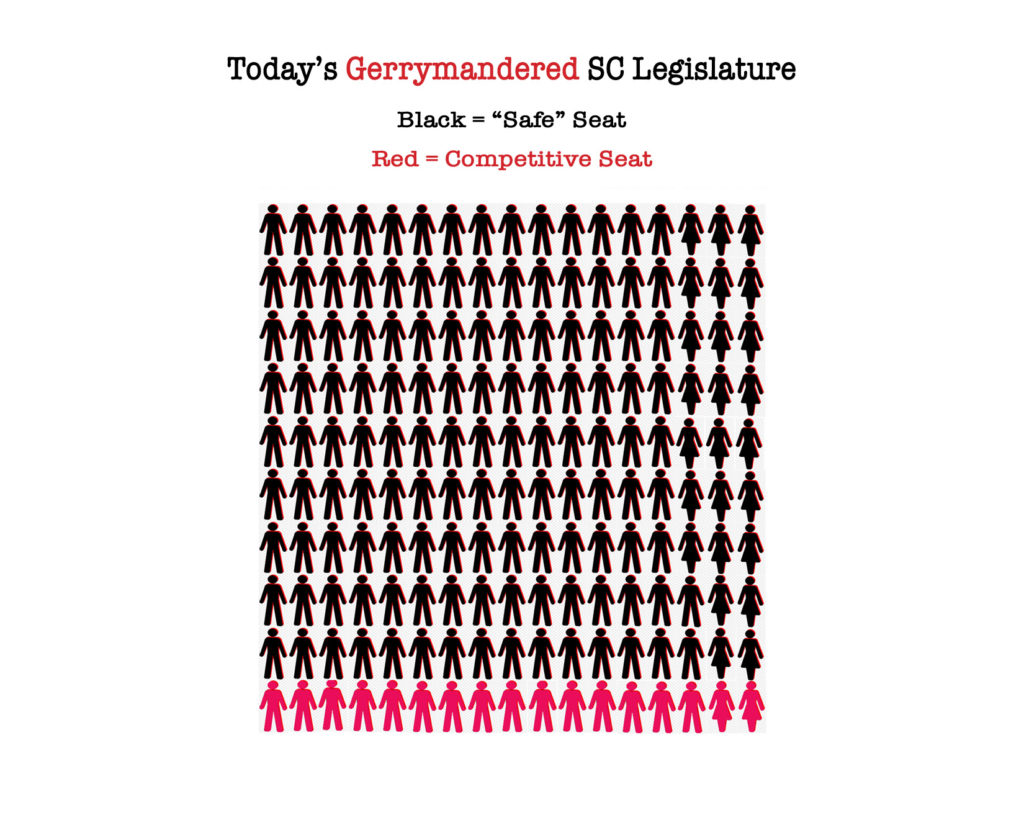 The task at hand is studying and debating the several proposals that have been filed, and finding common ground that, ultimately, gets politicians out of the business of picking their voters.
The task at hand is studying and debating the several proposals that have been filed, and finding common ground that, ultimately, gets politicians out of the business of picking their voters.
“South Carolina has more problems with gerrymandering than any state in the United States of America,” Sen. Fanning said. “It is not a Republican problem or a Democratic problem; it is a people not having a voice in their government problem. For every solid, safe Republican seat we have a solid, safe Democratic seat. We have created an apartheid here in South Carolina that has divided the voters at the whim of politicians.”
Rep. Cobb-Hunter said, “We all can agree the system is, indeed, rigged.” She vowed to support any fair maps bill that gets traction. “It makes for a better South Carolina, a better governance when all of us who are blessed and highly favored enough to be in these positions when we have to reach out to everybody as opposed to a select group.”
Rep. Clary said, “What we’re talking about here is fundamental fairness. The idea that I, or any other member of the General Assembly, can go in and adjust the line to suit my whim – -to move someone out of my district or to remove a group from my district — is repugnant to me.”
Sen. Davis said, “What we have is a crisis of legitimacy. The idea that I or any other member of the General Assembly can go in and adjust the line to suit my whim – to move someone out of my district or to remove a group from my district is repugnant to me. What we’re talking about is restoring people’s faith in representative government. This is about returning power to the sovereign people.”
Fanning, a former social studies teacher, said he taught civic engagement. “We registered to vote in my class. I made sure my students knew where to vote and when to vote. I had pumped them up, with as much passion as I had inside me. What broke my heart is that when my students came back and said, ‘There was only one name on the ballot. My vote didn’t matter.’ There wasn’t anything I could say to that.
“We have banded together as Republicans and Democrats in the Senate and the House. Each of us has bills, but none has gotten traction because the argument doesn’t belong to us, the argument belongs to the people.”
Preston Anderson has taken that directive to heart. As a volunteer with the Fair Maps SC Coalition has spent months going to events to talk about fair maps and gather signatures for the Richland County petition drive. By now he has talked to hundreds of South Carolinians. “Across the political spectrum, people were very interested in learning more about gerrymandering and the effect it has had on the political situation in South Carolina.”
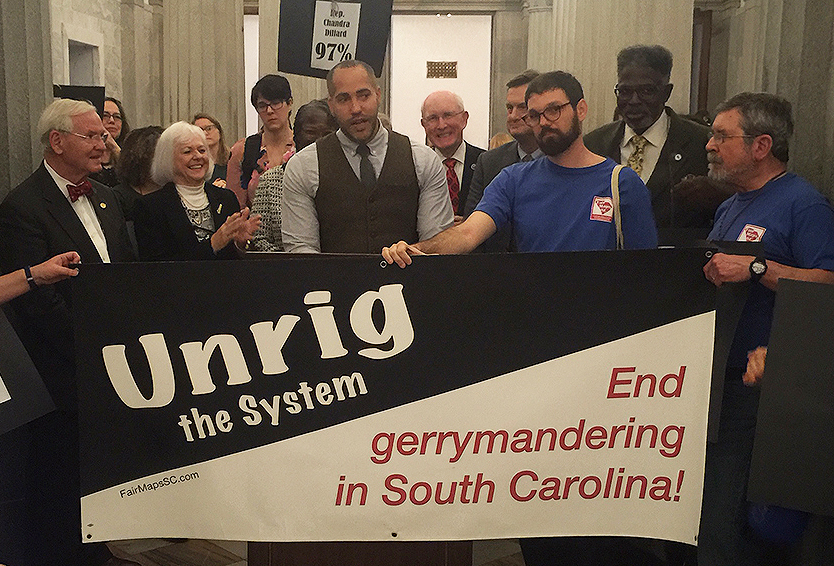 Fair Maps organizer Preston Anderson
Fair Maps organizer Preston Anderson
Fair Maps volunteers who have been in the field see a steep learning curve ahead. They are finding that a surprising number of voters know little to nothing about gerrymandering and how it corrodes the integrity of South Carolina’s elections. Same goes for lawmakers.
To that end, we gave each of them our handout full of numbers that should alarm anyone who cares about the state of democracy in South Carolina.
For more about the Fair Maps Coalition, (the SC Progressive Network is a member) see FairMapsSC.com.

